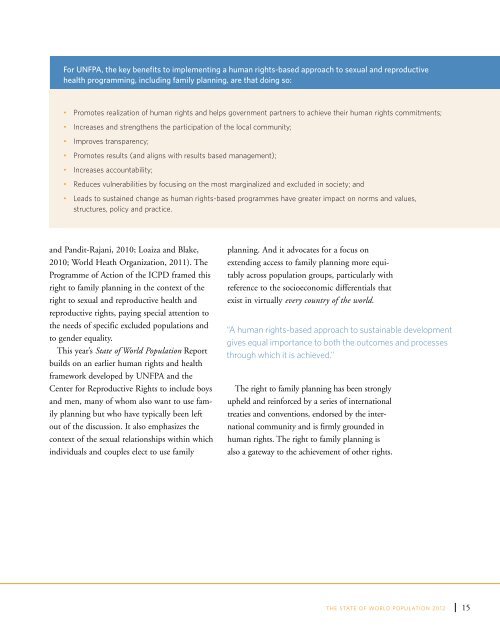State of World Population 2012 - Country Page List - UNFPA
State of World Population 2012 - Country Page List - UNFPA
State of World Population 2012 - Country Page List - UNFPA
You also want an ePaper? Increase the reach of your titles
YUMPU automatically turns print PDFs into web optimized ePapers that Google loves.
For <strong>UNFPA</strong>, the key benefits to implementing a human rights-based approach to sexual and reproductive<br />
health programming, including family planning, are that doing so:<br />
• Promotes realization <strong>of</strong> human rights and helps government partners to achieve their human rights commitments;<br />
• Increases and strengthens the participation <strong>of</strong> the local community;<br />
• Improves transparency;<br />
• Promotes results (and aligns with results based management);<br />
• Increases accountability;<br />
• Reduces vulnerabilities by focusing on the most marginalized and excluded in society; and<br />
• Leads to sustained change as human rights-based programmes have greater impact on norms and values,<br />
structures, policy and practice.<br />
and Pandit-Rajani, 2010; Loaiza and Blake,<br />
2010; <strong>World</strong> Heath Organization, 2011). The<br />
Programme <strong>of</strong> Action <strong>of</strong> the ICPD framed this<br />
right to family planning in the context <strong>of</strong> the<br />
right to sexual and reproductive health and<br />
reproductive rights, paying special attention to<br />
the needs <strong>of</strong> specific excluded populations and<br />
to gender equality.<br />
This year’s <strong>State</strong> <strong>of</strong> <strong>World</strong> <strong>Population</strong> Report<br />
builds on an earlier human rights and health<br />
framework developed by <strong>UNFPA</strong> and the<br />
Center for Reproductive Rights to include boys<br />
and men, many <strong>of</strong> whom also want to use family<br />
planning but who have typically been left<br />
out <strong>of</strong> the discussion. It also emphasizes the<br />
context <strong>of</strong> the sexual relationships within which<br />
individuals and couples elect to use family<br />
planning. And it advocates for a focus on<br />
extending access to family planning more equitably<br />
across population groups, particularly with<br />
reference to the socioeconomic differentials that<br />
exist in virtually every country <strong>of</strong> the world.<br />
“A human rights-based approach to sustainable development<br />
gives equal importance to both the outcomes and processes<br />
through which it is achieved.”<br />
The right to family planning has been strongly<br />
upheld and reinforced by a series <strong>of</strong> international<br />
treaties and conventions, endorsed by the international<br />
community and is firmly grounded in<br />
human rights. The right to family planning is<br />
also a gateway to the achievement <strong>of</strong> other rights.<br />
THE STATE OF WORLD POPULATION <strong>2012</strong><br />
15
















